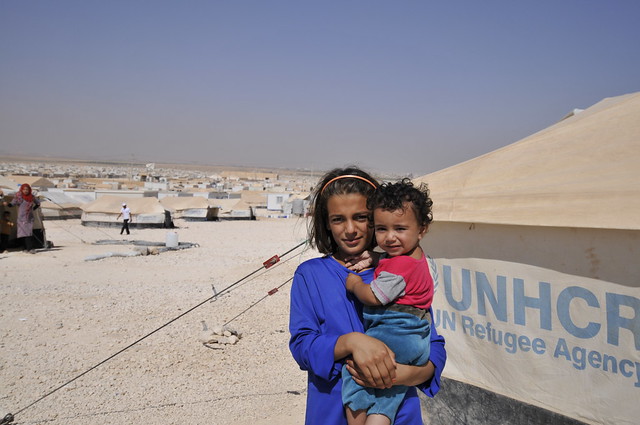19th February 2014 Washington DC, USA
Syrian Children Need Our Help
My children are the most delightful people I know. You probably feel the same about your children, your grandchildren, your nieces and nephews. My son is a mix of winning charm and 3 year old defiance. My daughter, who is 9 months, is smiley, chubby and cuddly. My children live in a protective environment: one where they can grow, develop and learn in safety, that will give them the best chance of leading happy, fulfilled and full lives. In that, their lives are similar to so many other small children in the US, UK and around the world.
It’s not the same for children in Syria. Many of Syria’s children are now irreparably damaged. They have lost homes, members of their families, they have witnessed bloodshed and events that have left them traumatised. Many lack the basic necessities of life; they are cold and hungry, and some of them are sick. Education is no longer available to them. Their parents (refugees, displaced or otherwise caught in the midst of Syria’s terrible civil war) are unable to protect them in the way any parent would want to. They are in danger of becoming a lost generation.

Almost 6 million of Syrian children are now in need. They are caught up in the immense humanitarian disaster that is playing out inside Syria and across Syria’s borders in formal and informal refugee camps in Turkey, Jordan and Lebanon. It’s estimated that almost 9.3 million people inside Syria are in dire need of humanitarian aid (that’s more than the population of Virginia), 4.2 of whom are children. 80% of these children are younger than 14. A further 2.4 million Syrians are refugees, and three quarters of them are women and children.
The UN estimates that over 3 million people inside Syria are currently not receiving the assistance they need, including up to a quarter of a million people trapped in besieged areas. A countless number of people are being denied access to food and medicines, and there are now terrible reports of innocent people dying from malnutrition. As Foreign Secretary William Hague notes in The Independent, the situation in Homs is acute. Homs has been under siege for more than 600 days, attacked by barrel bombs and artillery fire. According to UNICEF, those trapped include more than 1000 children. Some aid has now got in, but it’s only a tiny fraction of what’s needed. Some people – women, children, the elderly – are being permitted to leave. But it’s not clear if the evacuees will be protected and what will happen to those not permitted to leave (the regime has a history of following the limited evacuation of civilians with an assault on those left behind).
These figures are so awful that it’s often hard to see the human story behind them. These are ordinary people, ordinary families who are suffering terrible hardship at the hands of a regime that would prefer civil war to tear Syria apart than to relinquish any power. The Assad regime’s deliberate obstruction of humanitarian aid to the Syrian people is deplorable, let alone the stubborn determination with which the regime has prosecuted a war against its opponents.
The British Government has been at the forefront of the humanitarian response in Syria. We have pledged over $985 million, which makes us the second largest bilateral donor after the US (this is three times as much as the UK has contributed to any other humanitarian crisis). We have been working hard to improve access for humanitarian aid, including pressing Assad’s allies to push the regime do much more. As part of our No Lost Generation Initiative, we have allocated $49 million to provide protection, trauma care and education for those children affected by the crisis.
We are also continuing to press for a political solution to this conflict, but so far that has remained elusive. In the meantime, the most important thing all governments can do is to ensure the UN’s humanitarian work is properly supported. The UN estimates it will need $6.5 billion for Syria for 2014; so far it has received pledges of $2.4 billion.
The UK will also continue to press for action this week in the UN Security Council. We want the Security Council to require full and unimpeded humanitarian access to all areas of Syria, including to those areas being besieged by the regime; to demand an immediate end to the use of starvation as a weapon of war, and to impunity for violations of international humanitarian law and human rights abuses; and to call for the regime to stop using barrel bombs and other kinds of weaponry against innocent civilians across Syria. We want all fifteen members of the Security Council to come together unanimously behind a resolution to improve the appalling humanitarian situation.
I cannot become inured to what’s going on in Syria; I hope you can’t too. The Syrian people need our help and their children need our protection. Think of them as you spend time with your children today. I know I will.